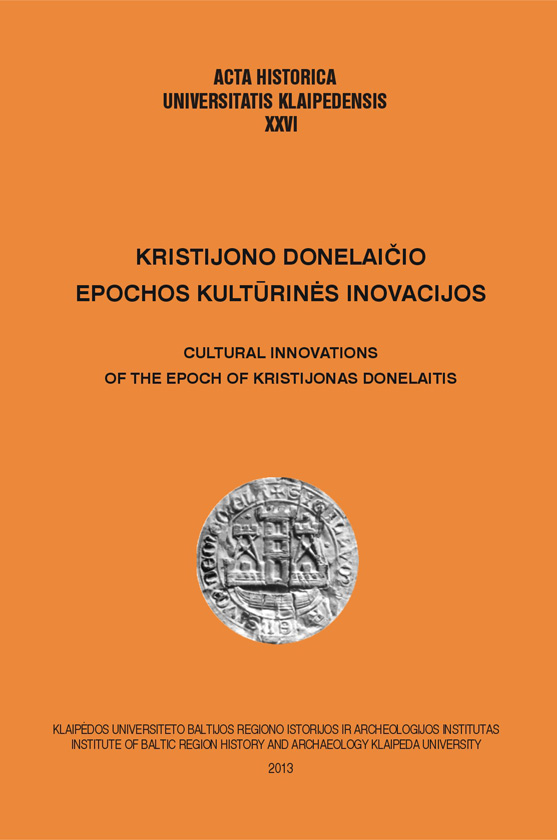Volume 26 (2013): Kristijono Donelaičio epochos kultūrinės inovacijos = Cultural Innovations of the Epoch of Kristijonas Donelaitis, November 2013

Order by:
Pub. online: 19 Nov 2013
Type: Introduction
 Open Access
Open Access
Journal:
Acta Historica Universitatis Klaipedensis
Volume 26 (2013): Kristijono Donelaičio epochos kultūrinės inovacijos = Cultural Innovations of the Epoch of Kristijonas Donelaitis, pp. 5–8
Pub. online: 19 Nov 2013
Type: Introduction
 Open Access
Open Access
Journal:
Acta Historica Universitatis Klaipedensis
Volume 26 (2013): Kristijono Donelaičio epochos kultūrinės inovacijos = Cultural Innovations of the Epoch of Kristijonas Donelaitis, pp. 9–12
Pub. online: 19 Nov 2013
Type: Article
 Open Access
Open Access
Journal:
Acta Historica Universitatis Klaipedensis
Volume 26 (2013): Kristijono Donelaičio epochos kultūrinės inovacijos = Cultural Innovations of the Epoch of Kristijonas Donelaitis, pp. 13–21
Abstract
Pub. online: 19 Nov 2013
Type: Article
 Open Access
Open Access
Journal:
Acta Historica Universitatis Klaipedensis
Volume 26 (2013): Kristijono Donelaičio epochos kultūrinės inovacijos = Cultural Innovations of the Epoch of Kristijonas Donelaitis, pp. 22–31
Abstract
Pub. online: 19 Nov 2013
Type: Article
 Open Access
Open Access
Journal:
Acta Historica Universitatis Klaipedensis
Volume 26 (2013): Kristijono Donelaičio epochos kultūrinės inovacijos = Cultural Innovations of the Epoch of Kristijonas Donelaitis, pp. 32–42
Abstract
Pub. online: 19 Nov 2013
Type: Article
 Open Access
Open Access
Journal:
Acta Historica Universitatis Klaipedensis
Volume 26 (2013): Kristijono Donelaičio epochos kultūrinės inovacijos = Cultural Innovations of the Epoch of Kristijonas Donelaitis, pp. 43–54
Abstract
Pub. online: 19 Nov 2013
Type: Article
 Open Access
Open Access
Journal:
Acta Historica Universitatis Klaipedensis
Volume 26 (2013): Kristijono Donelaičio epochos kultūrinės inovacijos = Cultural Innovations of the Epoch of Kristijonas Donelaitis, pp. 55–64
Abstract
Pub. online: 19 Nov 2013
Type: Article
 Open Access
Open Access
Journal:
Acta Historica Universitatis Klaipedensis
Volume 26 (2013): Kristijono Donelaičio epochos kultūrinės inovacijos = Cultural Innovations of the Epoch of Kristijonas Donelaitis, pp. 65–78
Abstract
Pub. online: 19 Nov 2013
Type: Article
 Open Access
Open Access
Journal:
Acta Historica Universitatis Klaipedensis
Volume 26 (2013): Kristijono Donelaičio epochos kultūrinės inovacijos = Cultural Innovations of the Epoch of Kristijonas Donelaitis, pp. 79–89
Abstract
Pub. online: 19 Nov 2013
Type: Article
 Open Access
Open Access
Journal:
Acta Historica Universitatis Klaipedensis
Volume 26 (2013): Kristijono Donelaičio epochos kultūrinės inovacijos = Cultural Innovations of the Epoch of Kristijonas Donelaitis, pp. 90–98
Abstract